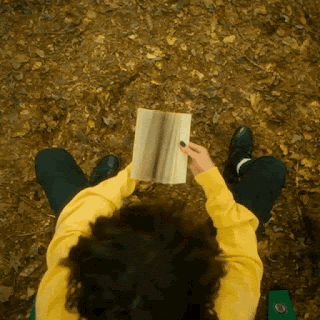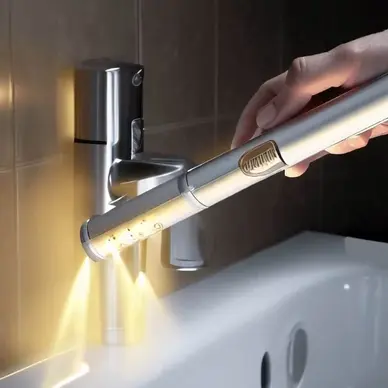Are you sick of thinking all the time about how clean the air you breathe is? Do you have to clean and disinfect objects all the time to keep your family safe? The UV-C air cleaner is all you need.
This new technology uses UV light to clean the air and objects in your home, giving you a level of cleanliness that you can't get with traditional cleaning methods.
The UV-C air purifier is a huge step forward in a world where cleaning is more important than ever.
Come along with me as we talk about the pros and cons of this new technology.
Understanding UV-C Light Sanitization

UV-C Air Purifier: Disinfecting Surfaces with UV Light
UV-C light is a type of ultraviolet light with a certain wavelength that kills bacteria.
It is a radiation method that is becoming more popular as a way to make hospitals, schools, and workplaces safer and cleaner places to be.
During the COVID-19 pandemic, people may also want to buy UV-C light to clean the surfaces in their homes.
But it's important to remember that not all UV-C lamps kill viruses and bugs well.
How UV-C Light Works
UV-C light kills microorganisms by damaging their DNA and RNA, which stops them from growing and makes them safe.
The FDA says that this particular wavelength of ultraviolet light can kill bacteria, including the SARS-CoV-2 coronavirus.
The EPA has also studied how well UV-C light kills SARS-CoV-2 on surfaces so that people are less likely to be exposed to it.
The results showed that UV-C light is good at killing the virus on surfaces.
Effectiveness of UV-C Light as a Sanitizer
UV-C light can kill germs, but how well it works relies on several things, such as how bright the light is, how long the surface is exposed to it, and how far away the light source is from the surface being cleaned.
The effectiveness of UV-C light-based surface disinfection was looked at in a study that was released in the International Journal of Environmental Research and Public Health.
The study found that UV-C light works well to clean surfaces and can be used in many places, like hospitals and homes.
But the study also said that the effectiveness of UV-C light relies on things like how far away the light source is from the surface, how long the surface is exposed to the light, and what kind of microorganisms are being killed.
Safety Guidelines for Using UV-C Lamps
UV-C light is good at killing germs on surfaces, but it's important to remember that it can hurt people if it's not used correctly.
When UV-C light hits your face and eyes for a long time, it can hurt them.
Because of this, it's important to follow safety rules when using UV-C lights to clean something.
It's also important to remember that not all UV-C lamps are the same, and some may not kill viruses and germs as well as others.
People who want to buy UV-C lamps should do their study and only buy them from reputable places.
"UV-C Lamp: The Ultimate Solution for Disinfecting Surfaces"
If you're looking for a powerful and effective way to disinfect surfaces, then a UV-C lamp is the perfect solution for you.
This type of lamp emits ultraviolet light that can kill bacteria, viruses, and other harmful microorganisms that may be lurking on surfaces in your home or workplace.
UV-C lamps work by emitting a specific wavelength of light that is lethal to microorganisms.
When the light comes into contact with a surface, it penetrates the cell walls of any microorganisms present and destroys their DNA, rendering them unable to reproduce or cause harm.
Using a UV-C lamp is a safe and chemical-free way to disinfect surfaces, making it an ideal choice for those who are concerned about the environment and their health.
Plus, it's easy to use and can be used on a variety of surfaces, including countertops, doorknobs, and even electronic devices.
So, if you want to keep your home or workplace clean and free from harmful microorganisms, consider investing in a UV-C lamp today.
For more information:
UV-C Lamp: Disinfecting Surfaces SafelyUV-C Lamp: Disinfecting Surfaces Safely
Using UV-C Light as a Sanitizer
Disinfecting Surfaces with UV-C Air Purifiers
UV-C light is a well-known way to clean the air, water, and surfaces that don't have pores.
This kind of radiation can be used to help clean and disinfect places like hospitals, businesses, factories, grocery stores, schools, and hotels.
UV-C light can kill germs on surfaces like metal, glass, and plastic that don't have pores.
But it's important to remember that UV-C light can't get through porous materials like fabric or carpet.
Safety Precautions
UV-C light is a good way to kill germs, but there are some safety measures you need to take when using it to clean.
UV-C radiation can cause serious burns on the skin and eye injuries, such as photokeratitis.
So, it's important to keep your skin away from UV-C rays and to never look straight into a UV-C light source, even for a short time.
UV-C Products
UV-C goods give off UV-C rays, which are more powerful than the sun's UV-A and UV-B rays.
UV-C light can burn the skin and hurt the lens of the eye if you get too much of it.
So, safety rules need to be followed when installing and using the goods to make sure they work well and are safe.
Using UV-C Light-Based Sanitizers
It is best to take a few measures when using UV-C light-based sanitizers so that they work well and are safe to use.
For example, it's important to use UV light disinfection, which is good for the environment and doesn't use chemicals, to sterilize shared surfaces, phones, tools, doorknobs, furniture, and other things.
Also, you should stay away from direct UV-C light and use the devices in a well-ventilated place.
Disinfecting with UV-C Light
Disinfecting Surfaces with UV-C Light: An Effective Solution with Some Risks
UV-C light has been used to clean the air, surfaces, and things for many years.
It is a strong tool that can kill a wide range of germs and viruses, including the SARS-CoV-2 coronavirus.
But it's important to use it the right way and in combination with other ways to clean and sterilize.
Factors Affecting UV-C Disinfection
How long it takes UV-C light to disinfect a surface relies on many things, such as how strong the light is, how close it is to the surface, and how long it is exposed to the light.
Regency Lighting says that the amount of time that germicidal UV needs to kill a disease depends on the type of pathogen and how strong the UV light is.
For example, "E coli" dies after about 10 seconds of contact and the flu virus dies after about 20 seconds.
But some kinds of germs can live for up to 45 minutes.
Effectiveness Against SARS-CoV-2
The FDA says that UVC lights can kill the SARS-CoV-2 coronavirus, but this depends on a number of things, such as how far away the lamp is from the surface, how bright the light is, and how long the surface is exposed to it.
The FDA says to follow the manufacturer's advice for the UVC lamp being used and to keep skin and eyes away from direct light.
A study published in BMC Infectious Diseases found that UV-C lamps could be used to clean and cleanse hospital surfaces that have been contaminated by SARS-CoV-2 in addition to what is already done.
The study says that surfaces should be cleaned with UV-C light for at least 15 minutes.
But the study also says that UV-C lamps shouldn't be the only way to clean and disinfect.
Instead, they should be used with other cleaning and disinfecting ways.
UV-C Light for Small and Large Surfaces
Small and big areas can both be cleaned with UV-C light.
Philips has a wide variety of UV-C lights that can clean the air, surfaces, and things.
Risks of UV-C Light
It is important to remember that UV-C light can hurt people and animals if it is not used correctly.
Direct contact to UV-C radiation can irritate the skin, hurt the eyes, and cause other health problems.
Because of this, UV-C lamps should only be used in empty rooms or with the right safety gear.
Also, UV-C lamps should be used with other cleaning and disinfecting methods because they may not be effective against all types of germs.
UV-C light is a strong way to clean and cleanse surfaces, but it should be used carefully.
Follow the directions from the maker and use it along with other cleaning and disinfecting methods.
UV-C light can be a good way to keep surfaces clean and free of dangerous pathogens if it is used the right way.
Benefits and Limitations of UV-C Light Sanitization
Benefits of UV-C Air Purifiers
- Fast and Efficient: UV-C light is faster and more efficient than other methods of disinfection. It is also more efficient at low dose rates, making it a cost-effective solution for disinfection.
- No Residue or Cleanup: Unlike chemical disinfectants, UV-C light does not leave any residue or require any cleanup after use.
- Safe for a Wide Range of Surfaces: UV-C light is safe for use on a wide range of surfaces, including electronics and fabrics.
- Easy to Use: UV-C light does not require any special training or handling procedures. It is easy to use and can be operated by anyone with minimal training.
- Environmentally Friendly: UV-C light does not produce any harmful byproducts or chemicals, making it an environmentally friendly choice.
Risks of UV-C Air Purifiers
- Skin and Eye Irritation: UV-C light can cause skin and eye irritation if not used properly. Prolonged exposure can lead to skin damage and even cancer. It is important to follow safety guidelines and use protective equipment when using UV-C light as a sanitizer.
- Limited Published Data: The effectiveness of UV-C lamps in inactivating the SARS-CoV-2 virus is unknown because there is limited published data about it.
- Less Effective Than Other Radiations: UVC radiation is less effective than either UVB or UVA radiation at inactivating other SARS viruses.
- Safety Concerns: Consumer devices that use UV light to sanitize surfaces may have more risks than they're worth. The FDA advises consumers to avoid using UV-C lamps to disinfect the skin or any other part of the body because of the risk of skin damage.
UV-C light is a good way to kill viruses, including the SARS-CoV-2 virus.
But it can't clean the air as well as some other things.
There isn't much information out there about how well UV-C light kill the SARS-CoV-2 virus.
Also, UV-C radiation kills SARS viruses less well than other types of radiation, and consumer products that use UV light to clean surfaces may be more dangerous than they are worth.
When using UV-C light to clean, it's important to follow safety rules and wear protective gear.
UV-C Light vs Chemical Disinfectants
UV-C Air Purifier: Disinfecting Surfaces with UV Light
Chemical disinfectants and UV-C light are both good ways to cut down on healthcare-associated diseases.
UV-C light, on the other hand, has been shown to be very effective against viruses and bacteria.
This makes it a popular choice for disinfecting surfaces in places like hospitals, restaurants, and jails where cleanliness is important.
Effectiveness of UV-C Light
Studies have shown that UV-C light is better at preventing healthcare-associated infections than normal chemical disinfectants.
In isolation units, a study looked at how well UV-C lights on the ceiling and walls killed bacteria compared to standard chemical disinfectants.
It found that UV-C lights were more successful.
Another study looked at how using pulsed xenon-based ultraviolet light no-touch disinfection systems (PX-UVC) in addition to the current standard operating protocol (SOP) for disinfecting terminal rooms affected the number of healthcare-associated infections and found that it worked.
Safety of UV-C Light
Chemical disinfectants and UV-C light are safe in different ways.
Chemical disinfectants can be harmful, irritate the skin, and make it hard to breathe.
If UV-C light isn't used right, it can hurt your skin and eyes.
But UV-C light does not leave behind any chemicals and does not cause bacteria to become immune to antibiotics.
UV-C Radiation as a Disinfectant
UV-C light is known to clean the air, water, and surfaces that don't have pores.
UV-C light has been used to clean surfaces, liquids, the air, and buildings for many years.
UV disinfection machines can be used on top of regular cleaning practices and are often found in hospitals and other healthcare settings.
UV-C light breaks down nucleic acids, which stops a virus from working.
A study of the scientific literature on the effectiveness of radiation against viruses, including human coronaviruses, shows that the dose needed to kill 90% of SARS-CoV-2 is between 3.6 and 10 mJ/cm2.
UV-C Light for Specific Applications
Lighting experts can use UV technology to make UV lamps for specific uses, such as treating water, cleaning the air, and killing germs on surfaces.
Personal safety equipment (PPE) can also be cleaned with UV-C light.
During the COVID-19 pandemic, people might want to buy UV-C light to clean surfaces in their homes and other places.
But it's important to remember that UV-C lamps can be dangerous to people and should only be used with care and in the way that the maker says.
Conclusion

In conclusion, the UV-C air cleaner changes the game when it comes to using UV light to clean surfaces.
It's a strong tool that can help keep harmful bacteria and viruses out of your home or office.
But like any other tool, it's important to use it in the right way and safely.
One thing to remember is that UV-C light is good at killing germs, but if it isn't used correctly, it can hurt people.
So, it's important to carefully follow the directions from the manufacturer and stay away from direct light.
Another thing to think about is that the UV-C air purifier is a great way to clean surfaces, but it can't replace good cleanliness.
Still important ways to stop the spread of germs are to wash your hands often, clean and cleanse surfaces, and wear a mask.
In the end, the UV-C air filter is just one tool we can use to fight germs and viruses.
But when used right, it can be a strong one.
So, it's something you should think about if you want to keep your home or office clean and healthy.
Just make sure to use it in a safe way and with other good health habits.
Socrates, the great Greek philosopher, once said, The only true wisdom is knowing you know nothing.
So, let's keep an open mind and keep learning and growing in our knowledge of how to stay healthy and safe for ourselves and our communities.
Looking for a new UV sanitizing wand?
Choosing a gadget can be very difficult if you know nothing about the technology.
Some will pay for features they do not need while others may not consider what they really want.
So I created this quick, newbie guide to help you focus on what is really important to you:
0 2-6-17The Best Uv Sanitizing Wand (For You!)Links and references
My article on the topic:
uv1UVC Sanitizer: Disinfecting Surfaces SafelyNote for my reference: (Article status: preliminary)


